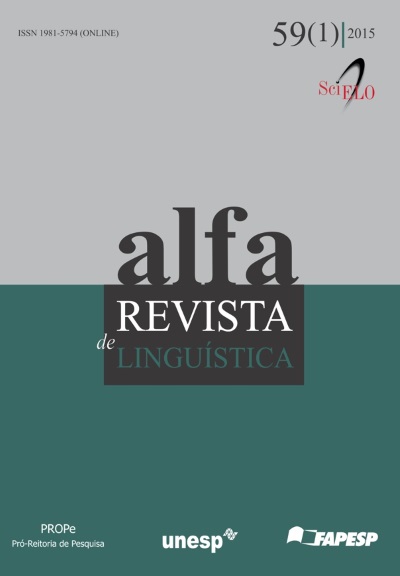Different exhaustivity effects in clefts: a descriptive study of cases
DOI:
https://doi.org/10.1590/1981-5794-1502-3Keywords:
Cleft sentences, Exhaustiveness effects, Identification by exclusion, Contextual set of alternatives, Pragmatic inferences,Abstract
In this article, we show that cleft sentences may have ‘exhaustiveness effects’ quite different from the ‘identification by exclusion’ – which is the effect usually discussed by the literature (ATLAS; LEVINSON, 1981; HORN, 1981; KISS, 1998; WEDGWOOD; PETHO; CANN, 2006; BÜRING; KRIZ, 2013). To show this, we present a detailed study of cases in which we test the contextual effects triggered by clefts found in Brazilian magazines and newspapers. Our testing tools are modifiers that the literature associates with exhaustiveness, such as ‘only’ and ‘and nobody else’ (ATLAS; LEVINSON, 1981; HORN, 1981), and ‘exactly’ and ‘precisely’ (MENUZZI; ROISENBERG, 2010a). On the basis of such tests, we conclude that ‘exhaustiveness effects’ involve various types of inferences about the structure of the domain of the discourse referents, and may modify such a structure in many different ways. We believe this result puts into a new perspective many of the questions about the semantics and the pragmatics of clefts, in particular whether ‘exhaustiveness effects’ are conventionalized pragmatic inferences (such as a presupposition, or a generalized implicature), or particularized implicatures.Downloads
Download data is not yet available.
Downloads
Published
23/02/2015
How to Cite
TEIXEIRA, M.; MENUZZI, S. Different exhaustivity effects in clefts: a descriptive study of cases. ALFA: Revista de Linguística, São Paulo, v. 59, n. 1, 2015. DOI: 10.1590/1981-5794-1502-3. Disponível em: https://periodicos.fclar.unesp.br/alfa/article/view/6209. Acesso em: 4 mar. 2026.
Issue
Section
Papers
License
Manuscripts accepted for publication and published are property of Alfa: Revista de Linguística. It is forbidden the full or partial submission of the manuscript to any other journal. Authors are solely responsible for the article's content. Translation into another language without written permission from the Editor advised by the Editorial Board is prohibited.

